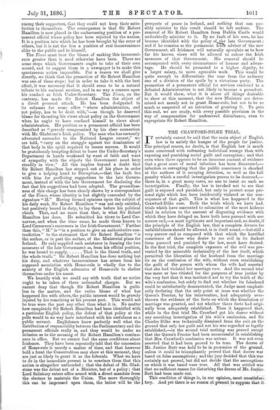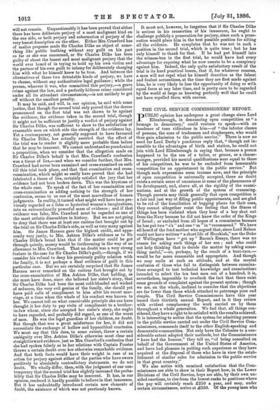THE CRAWFORD-DILBE TRIAL.
IT certainly cannot be said that the main object of English law is to satisfy the hunger of the people for justice. The principal reason, no doubt, is that English law is much more concerned with redressing individual wrongs than with exposing and punishing social guilt and corruption ; and that even when there appears to be an immense amount of evidence that a great mass of moral infection has been discovered,— infection so corrupting that the public conscience is shocked at the authors of it escaping detection, as well as the full penalty which a careful investigation proves to be deserved,— there is, in a great many cases, no one to insist on such an investigation. Finally, the law is invoked not to see that guilt is exposed and punished, but only to protect some per- sonal right which has been incidentally violated as the con- sequence of that guilt. This is what has happened in the Crawford-Dilke case. Both the trials which we have had, trials which have amounted to calamities of the most hideous kind in relation to the amount of disgusting evidence with which they have deluged us, have both been pursued with one narrow end,—a most legitimate and important end, no doubt, if the principle of the English law, that a complete divorce for unfaithfulness should be allowed, is in itself sound,—but still a -very narrow end as compared with that which the horrified conscience of those who desire to see evil in its darkest form pursued and punished by the law, must have desired. In the first trial, the complete exposure of the evil was pre- vented by the miserable technicality of the law itself, whicA permitted the liberation of the husband from the marriage tie on the confession of the wife, without even establishing the guilt of the person with whom the wife had asserted that she had violated her marriage vow. And the second trial was more or less vitiated for the purposes of true justice by the very fact that it was instituted not to try the truth of the wife's confession, but solely to find out whether its falsehood could be satisfactorily demonstrated, the Judge most emphati- cally declaring that the only point at issue was whether the Queen's Proctor, by his intervention, had adequately over- thrown the evidence of the facts on which the dissolution of marriage was granted, and not whether those facts had origi- nally been adequately established. Thus it happened that, while in the first trial Mr. Crawford got his decree without any searching investigation of his wife's confession, and Sir Charles Dilke was technically dismissed from the suit on the ground that only her guilt and not his was regarded as legally established,—in the second trial nothing was proved except that the Queen's Proctor had been unsuccessful in establishing. that Mrs. Crawford's confession was untrue. It was not even asserted that it had been proved to be true. The decree of Mr. Justice Butt was held to be in possession of the ground, unless it could be triumphantly proved that that decree was based on false assumptions ; and the jury decided that this was certainly not proved, but did not decide that the aasumptione on which it was based were true. All that was settled was that no sufficient reason for disturbing the decree of Mr. Justice. Butt had been made out.
This condition of things is, in our opinion, most unsatisfact,:, tory. And yet there is no reason af. present to euppose that it.
will not remain. Unquestionably it has been proved that either there has been deliberate perjury of a most malignant kind on the one side, or both perjury and subornation of perjury of the very basest description on the other. Either Mrs. Crawford has of malice prepense made Sir Charles Dilke an object of some- thing like public loathing without any guilt on his part so far as she was concerned, or Sir Charles Dilke has been guilty of about the basest and most malignant perjury that the world ever heard of in trying to hold up his own victim and the partner of his own guilt to infamy for deliberately charging him with what he himself knew to be true. And between the alternatives of these two detestable kinds of perjury, we have to choose, without any authoritative legal guidance ; while the person, whoever it was, who committed this perjury,—a grave crime against the law, and a perfectly hideous crime considered under all its attendant circumstances,—is not unlikely to get off without the smallest penalty. It may be said, and will, in our opinion, be said with some justice, that though the second trial only proved that the decree pronounced on the first trial was not shown to be against the evidence, the evidence taken in the second trial, though it might not be sufficient to justify a verdict of perjury against Sir Charles Dilke, was sufficient to show to the satisfaction of reasonable men on which side the strength of the evidence lay. Yet a contemporary, not generally supposed to have favoured Sir Charles Dine, has actually asserted that the effect of the trial was to render it slightly more probable than before that he may be innocent. We cannot understand so paradoxical a proposition, when we consider that the allegation made on Sir Charles Dilke's behalf is that Mrs. Crawford's confession was a tissue of lies,—and when we consider further, that Mrs. Crawford had never been examined and cross-examined on oath till this trial took place, and that that examination and cross- examination, which might so easily have proved that she had fabricated a tissue of lies, certainly satisfied the jury that her evidence had not been broken down. This was the keystone of the whole case. To speak of the fact of her examination and cross-examination as adding nothing to the strength of her confession, seems to us one of the most marvellous of human judgments. In reality, it turned what might well have been pre- viously regarded as a false or hysterical woman's imaginations, into an extraordinarily powerful mass of evidence ; and if that evidence was false, Mrs. Crawford must be regarded as one of the most artistic dissemblers in history. But we are not going to deny that there was at least one curious fact brought out by the trial on Sir Charles Dilke's side, as well as very many against him. Sir James Hannen gave the highest credit, and appa- rently very justly, to Mrs. Ashton Dilke's evidence as to Sir Charles Dilke's broad hint that if the matter could be got through quietly, money would be forthcoming in the way of an allowance to Mrs. Crawford. That no doubt was a very strong feature in the case for Sir Charles Dilke's guilt,—though, if we consider his refusal to deny his previously guilty relation with the family, it is not perhaps a final evidence of guilt in this particular case. But we are certainly surprised that Sir James Hannen never remarked on the curious fact brought out by the cross-examination of Mrs. Ashton Mike, that holding, as she must have done, since she believed her sister's story, that Sir Charles Dilke had been the most cold-blooded and wicked of seducers, the very evil genius of the family, she should yet have paid calls of compliment to him after his recent mar- riage, at a time when the whole of his conduct was known to her. We cannot tell on what conceivable principle she can have thought it her duty to pay visits of compliment to a brother- in-law whom, since she accepted her sister's story, she ought to have regarded, and probably did regard, as one of the worst of men. He was the legal guardian of her children, no doubt. But though that was a great misfortune for her, it did not necessitate the exchange of hollow and hypocritical courtesies. We must say that this does, to some extent, throw a certain ambiguity over Mrs. Ashton Mike's otherwise most clear and straightforward evidence, just as Mrs. Crawford's confession that she had spoken falsely as to her relations with Captain Forster throws a certain doubt over her otherwise remarkable evidence. And that both facts would have their weight in case of an action for perjury against either of the parties who have sworn positively to absolutely contradictory statements, we do not doubt. We wholly differ, then, with the judgment of our con- temporary that the second trial has slightly increased the proba- bility that Sir Charles Dilke may be innocent. It has, in our opinion, rendered it hardly possible to believe in that innocence. But it has undoubtedly introduced certain new elements of doubt, the existence of which was not previously known. It must not, however, be forgotten that if Sir Charles Dilke is serious in his reassertion of his innocence, he ought to challenge publicly a prosecution for perjury, since such a prose- cution would place him in the best possible position for sifting all the evidence. He complains that be was not in such a position in the second trial, which is quite true ; but he has only himself to thank for that. If he had put himself into the witness-box in the first trial, he would have had every advantage for exposing what he now asserts to be a conspiracy against him. Indeed, the only quite satisfactory result of the trial is its hard practical lesson, that if, for whatever reasons, a man will not repel what he himself describes as the falsest and foulest accusations, at the time they are first made against him, he is very likely to lose the opportunity of doing so with equal force at. any later time, and is pretty sure to be regarded by the world at large as knowing perfectly well that he could not have repelled them with success.



































 Previous page
Previous page